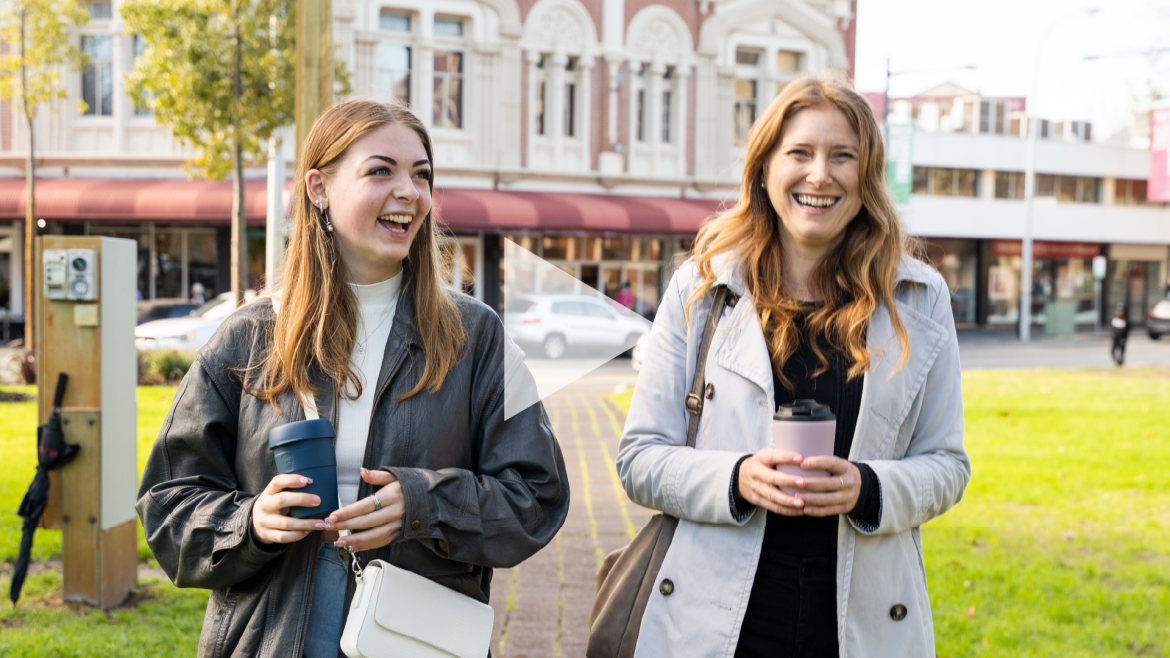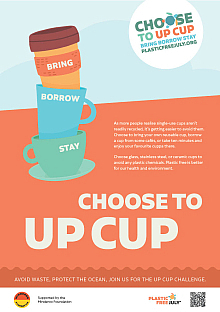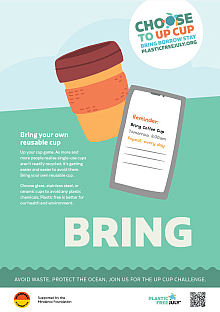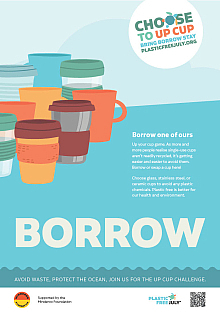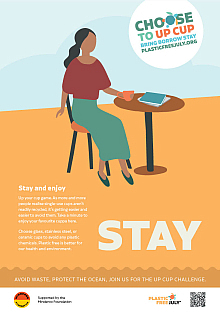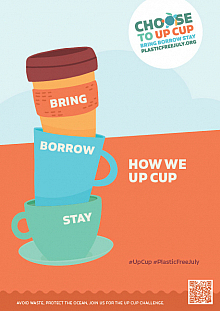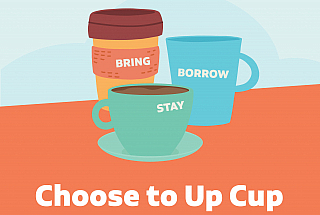Choose to Up Cup
As more people realise single-use cups aren’t readily recycled, it’s getting easier to avoid them. Up your cup game too – either bring your own reusable cup, borrow or swap a cup from some cafés, or take ten minutes and enjoy your favourite cuppa there. Help make a difference to avoid the billions of single-use cups that end up in landfill and litter each year, simply Bring, Borrow, Stay.

Get involved
Fortunately there are plenty of solutions to the single-use cup so we can still enjoy our favourite cuppa. The Up Cup challenge provides resources and ideas to help you (and millions of others around the world) reduce your coffee cup waste as well at work, in the community and even cafés.
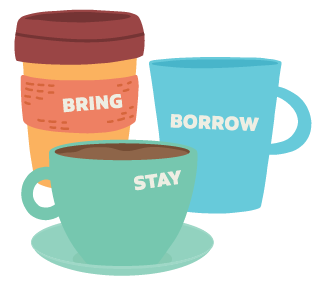
‘Up Cup’ is the new name for this whole habit of making better cup choices so we can all reduce plastic waste and together make a difference.
Some people up their cup game and remember to Bring their reusable cups by keeping them in their car, bag or at the desk so that they are always handy when they are needed. Often people forget their reusable cup because they weren’t planning on getting a coffee on the run. So being prepared means you are never caught short when the coffee urge strikes.
Choose glass, stainless steel, or ceramic cups to avoid any plastic chemicals. Plastic free is better for our health and environment.
Solutions for cafés which are growing in popularity are cup exchange schemes or informal ‘mug libraries’ where coffee lovers Borrow or swap a cup from participating cafés. Our cafe section shares some ideas for establishing a borrow scheme as well as ways to connect with existing schemes.
And perhaps best of all, choose to Stay. Sitting down to enjoy a coffee or other hot beverage from a ceramic cup or standing up for a morning espresso Italian-style is a great way to smell the coffee, without the waste!
You can amplify your impact by encouraging your friends, community groups or workplace to Up their Cup game too. Help create a mug library in the office kitchen, or research nearby cafés with a swap scheme. Distribute the posters, share the social media assets, or write an article for your company newsletter or intranet.
Scroll down to the Resource Library at the bottom of the page to download posters and social media assets.
If your favourite coffee spot needs a little encouragement to offer alternatives to single-use cups, ask them to get involved. You can provide posters, show them the public health advice about reusables being safe to use, or help them set up a mug library. Every single-use cup avoided is a win for the planet!
Check out our Resource Library below to get started.
For cafés
There are many ways cafés, restaurants, coffee vans and other hospitality venues can get on board with reducing single-use plastic waste. By offering your customers the option to bring, borrow or stay, you can significantly reduce your environmental impact, increase customer goodwill and potentially reduce costs.

Your customers will appreciate having a choice when it comes to their coffee order. It can be as simple as accepting BYO reusable mugs, offering a mug library, or finding a cup swap scheme that suits your café size and set-up.
The steps below show you how to help your customers to Bring, Borrow or Stay. The Resources Library at the bottom of the page contains posters and social media tiles to help you spread the word.
A mug library is a great, low-cost way to provide an alternative to single-use cups. Just follow these six simple steps to succes!
- Collect a range of ceramic mugs or keep-cup style reusable cups. Ask customers to donate, scour your local Buy Nothing sites, or buy some cheaply at your local op shop.
- Display the mugs in a box, basket or on a shelf. Make sure the set-up is easy to access and attractive to use.
- Add some signage to encourage customers to use the mug library if they forget their cup. Use our “Bring” poster or create your own. Make sure they know that they can use and return later, even on another day.
- Set up a return location for used cups. By the cafe door or somewhere that’s easy for customers and staff to access.
- Encourage staff to regularly collect used cups from the box, and wash as they would for dine-in cups. Replenishing the mug library often means there are always options available for your customer.
- Share the news on social media. Use our “Borrow” tile, or create your own.
Get some inspiration here: How bRU coffee is Upping its Cup Game
A cup exchange system helps customers who have forgotten their reusable cup, or don’t want to have to deal with carrying their used cup around all day. Numerous cup and container exchange systems exist already, or you can create your own with neighbouring cafes or office buildings.
Some things to think about:
- Cost to café and customer. Do you or your customers need to buy the cups or are they free as part of the exchange system?
- Type of cup and size: one advantage of an exchange system is that the mugs are a standard size and shape, easy to stack and mix and match. Some systems offer multiple sizes, others are one standard size.
- Cup material: plastic, ceramic or other? Different systems offer different cups.
Check Upstream‘s list for cup and container exchange schemes in your area.
Print and display the relevant poster(s) and point-of-sale sign.
Scroll to the bottom of the page for poster options.
Empower your staff to encourage customers to Up Cup as they place their orders.
Baristas ask: “How do you want to Up Cup today?”, “Do you want to Up Cup?”
“Will you be dining in today?”
“Did you bring a reusable mug today? Would you like to borrow one of ours?”
“Thank you for helping us to avoid single-use plastic”
Use our social media tiles in the Resource Library below, or create your own posts, to let your customers and community know that you are on board and how you are helping them to choose to Up Cup.
Hashtags: #upcup #plasticfreejuly
Why Up Cup?
Every year billions of takeaway coffee cups are consumed worldwide – making them one of the most used single-use plastic items in the world. The vast majority are landfilled; many are littered and become plastic pollution. Once in the environment, they break up into microplastics, which cause lasting harm to wildlife and marine ecosystems. Learn more about the issue, how we can all up our cup game and read about policies needed to increase reuse and decrease consumption of single-use cups.

I thought coffee cups were recyclable?
Paper-based disposable coffee cups are commonly thought to be recyclable, but they’re usually lined with a membrane of polyethylene (plastic). They are not readily recyclable with paper or cardboard, and they are not biodegradable. They are generally made with virgin paper and have a sizeable energy footprint.
Is it safe to use a reusable cup?
According to the World Health Organisation there is currently no evidence that people can catch COVID-19 from food or food packaging. is no evidence to show that reusables are less safe than a single-use cup, if the reusable has been washed properly and handled correctly.
Epidemiologist Professor Mary-Louise McLaws, stated at the height of the pandemic that ‘As long as baristas are practising good hand hygiene … are regularly washing their hands and not touching the rim of the cups then they should still be used. … We can do two things at once – take care of our health and reduce our impact on the environment. There is simply no excuse’ (Plastic Free, 2020).
Cups borrowed from cup exchange schemes and mug libraries are usually returned clean or put through a café’s dishwasher.
Some enterprising baristas have developed a contactless pour whereby they pour the shot/milk directly into a customer’s cup.
What’s the best reusable cup?
The one you already have!
Some people buy a special travel cup with a sealable lid whereas others bring a regular cup from home or the office. Popular choices include glass, ceramic and insulated stainless steel.
I always forget my reusable cup. What can I do then?
Our research shows most café coffee drinkers own a reusable cup but often hadn’t planned on getting a coffee on the run.
There are many options for when this scenario arises:
- Make the time to sit down and enjoy your coffee from a ceramic cup in the café.
- Find a café with a cup exchange system. You can borrow one of their cups, and drop it off later at the same café or another participating location. Upstream Solutions handy reuse directory map shows swap-and-go services worldwide.
- A growing number of cafés offer mug libraries. So if you are not going far, grab your coffee in one of their reusable mugs, drink it nearby and return when done.
And for next time, putting a reusable cup into your car or bag, will mean its always there when you need it!
“Disposable Coffee Cups: Our Unhealthy Addiction” policy paper prepared with WWF-Australia.
This paper makes the case for concerted effort to drive our reusable coffee cup economy and drastically reducing coffee cup waste. Working together, we can keep our obsession with quality coffee, ditch our wasteful and destructive habits, and support Australian innovation.
Resources Library



